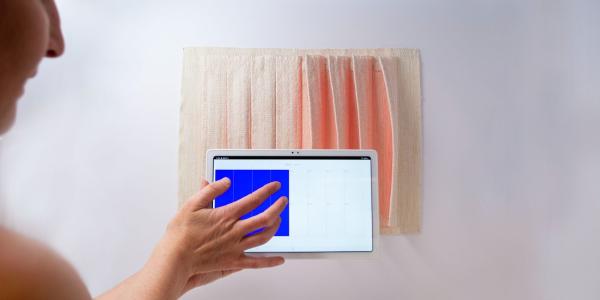
Laura Devendorf, an assistant professor of information science with the ATLAS Institute, has been awarded a National Science Foundation CAREER award, providing $550,000 over five years to support the development of smart textiles. The award, supporting the project Developing Next-Generation Rapid Prototyping Tools to Catalyze Innovation in Smart Textiles, is one of the most prestigious given to faculty in the early phases of their careers.
One way that Devendorf’s smart textile research is notable is the collaborations she’s sought out with weavers and members of the crafting community. A weaver herself, she took this approach from the start and is surprised it’s not more widespread.
“Despite 9,000 years of development in precise weaving techniques for stretching, integrating multiple layers, or even unfolding into three dimensions, most smart textile prototypes are created using the most primitive stitch,” she points out. “Craftspeople who have a deep and tacit understanding of textile structures are often not consulted or invited to participate in engineering research at early visioning phases.”
With the support of the NSF grant, Devendorf hopes to shift these kinds of norms in smart textile research by bringing experienced weavers to campus for a series of extended residencies over the next three years, enabling meaningful collaborations between residents and engineering design teams.
One of Devendorf’s overarching goals for the initiative is to develop new, open-source tools to support smart fabric development. Devendorf’s Unstable Design Lab previously developed one of the first digital frameworks for integrating circuit design into textile weaving. Over the next three years, she hopes to make new open-source, smart textile design resources freely available to engineering and crafting communities to accelerate innovation and the creation of increasingly sophisticated textiles.
Another key goal is to inform and support similar collaborations in the future. By thoroughly documenting each residency, Devendorf expects to identify approaches and behaviors that prove successful, and others that are less so. By compiling these, she will be able to share a compendium of best practices to guide similar research collaborations in the future.
“What we learn will be of value to other emerging domains that require a material skill in addition to an engineering mindset,” says Devendorf, pointing to smart ceramics and smart concrete as two examples.
While it will be a few years before that book is written, there’s one central practice that Devendorf will be promoting as Unstable Design Lab resident weavers initiate collaborations over the course of the grant: Involve artisan collaborators in every aspect of the work, including the technical. “I don’t look at a weaver as someone who is just there to make our work look pretty,” says Devendorf. “I’m looking to them to help fundamentally understand and advance the innovation.”
Devendorf’s CAREER award (NSF 17-537) is funded by the NSF’s Directorate for Computer and Information Science and Engineering Faculty Early Career Development Program.





